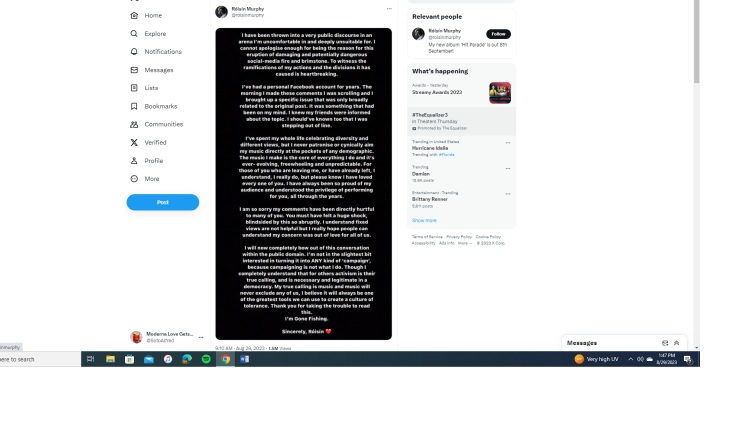A week ago I assembled a list of my fifty favorite albums, among which is Overpowered, the Róisín Murphy album which impressed me in 2007 for treating dance music as a valid way to express singer-songwriter observations about place, the media spotlight, as much as love. The former member of Moloko has since assembled an impressive discography; she was all set to follow up 2020’s excellent Róisín Machine.
Then this self-styled queer icon wrote remarks on her Facebook page in which she proved that musicians should stick to music if they risk hurting untold millions of fans. “Please don’t call me a terf, please don’t keep using that word against women,” Murphy wrote. “I beg you! but puberty blockers ARE FUCKED, absolutely desolate, big Pharma laughing all the way to the bank. Little mixed up kids are vulnerable and need to be protected, that’s just true.”
Dazed‘s James Greig will have none of her gibberish about medicine, a subject Murphy knows as much about as Ron DeSantis about George Eliot:
These are all pretty standard ‘gender-critical’ talking points and, to put it mildly, she is talking shit: rather than being “FUCKED”, the available evidence on puberty blockers suggests that the positive outcomes outweigh the negatives. Studies have shown that young trans people who can access puberty blockers experience a number of benefits, including increased well-being, decreased depression and reduced risk of suicide. As a form of treatment, they are endorsed by a majority of medical organisations (though maybe they forgot to consult Róisín Murphy?).
As for the ‘big Pharma’ claim, this just isn’t true: hormone medication can now be sold as ‘generic’, which means that no pharmaceutical companies hold an exclusive patent and, as a result, it is much less profitable. Likewise, trans people are such a small demographic that it would not make good business sense to promote gender-affirming care. When pharmaceutical companies promote certain medications and conditions (which, particularly in the US, they do) they are extremely unsubtle about it: they’re bribing doctors and launching huge advertising campaigns. In the context of gender-affirming care, this simply isn’t happening.
The infantilization of children by putatively well-intentioned adults remains an epidemic, yet here an artist who has triumphed with expressions of self-reliance resorts to mawkish banalities (“little mixed up kids”!).
After days of silence, Murphy released a statement, screenshot above. It was worse than I imagined. “I understand fixed views aren’t helpful” translates as “You’re not changing my mind, go away.” How she’ll handle the press is anybody’s guess. How easy to be an ally when appearing at Pride events and saying pretty words represent the limits of her commitments, not when many of the little mixed up kids whom she patronizes live in countries and American states where governments threaten their lives.
What depresses me — empties me out — is how few of these stories present trans people as people: punching bags, victims, demonstrations of piety, yes. Journalists can report on the rise of violence against trans and gender non-conforming people without resorting to clickbait tactics.


Dimwit. I may have liked a song or two of hers back in the Jukebox days, but damned if I’m gonna check on that now.
Not a dimwit. But wrong. But but but, everyone has to go through the eye of a needle now and no one, I mean no one, gets through. Thus the would-be coalitions constantly collide, and movements get myopic, mad and meaningless.